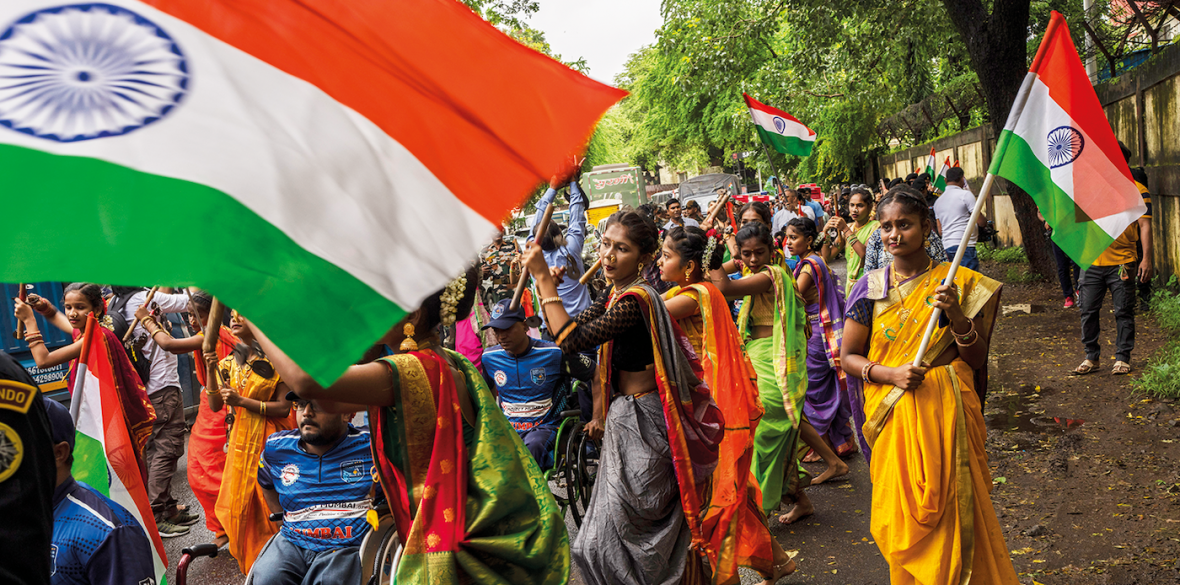This is the last article you can read this month
You can read more article this month
You can read more articles this month
Sorry your limit is up for this month
Reset on:
Please help support the Morning Star by subscribing here
TODAY Indians will unfurl the tricolour to celebrate the 75th anniversary of our independence. The Indian freedom struggle has not only shaped India as a modern constitutional democracy but also shaped the nature of our state, society and citizenship.
The anti-colonial, anti-capitalist, anti-feudal and anti-imperialist struggle were the four pillars of India’s cause — they laid the foundation of our sovereign nation state and created a promise to pursue a society based on socialist, scientific and secular values, to ensure egalitarian citizenship rights without any form of discrimination.
These inalienable values are central to the unity, integrity, peace, prosperity and progress of India as a multicultural society and secular state.
It is time to celebrate these values and the real promise of Indian independence, a product of the struggles and sacrifices of millions of working-class people across the country.
India at 75 is still a young nation but old enough for a critical introspection and evaluation of all the achievements, failures and challenges ahead.
Post-colonial India has managed to pursue economic progress and advancement in science and society at an unprecedented scale. The UN development programme has released its 2019 multidimensional poverty index which shows that India has lifted 271 million people out of poverty in a decade.
The availability and accessibility of healthcare and education has increased considerably over the years. The rapidly growing infrastructure for transport and communication is now visible across the country.
These significant improvements are testimony to the success of our welfare state — but these achievements alone have not been enough to address the unequal outcomes of a class, caste, gender and urban-rural bias which have taken new forms in the development process.
The widening gap between rich and poor, men and women, rural and urban areas, rising unemployment, poverty, homelessness, hunger and food insecurities are crucial challenges India is facing today. These challenges are accelerated by the capitalist development policies followed by the Hindutva government led by Narendra Modi.
The Hindutva government is also trying to transform the nature of the state and society to be concomitant with the exclusionary ideology of Hindutva, shaped by the right-wing Rashtriya Swayamsevak Sangh (RSS) Hindu nationalist paramilitary organisation.
The Hindutva forces led by RSS did not themselves participate in the anti-colonial struggle for Indian independence — yet these forces managed to subvert electoral democracy as a means to establish a capitalist Hindu Rastra (state) that is incompatible with constitutional, liberal and secular democracy in India.
Hindutva ideas and visions are completely opposed to the ideas and visions emanating from the Indian freedom struggle. The irony of flag-waving Hindutva nationalism is that it is historically an anti-national force in India.
The farmers, youth, students, Dalits, tribals and women were the flag bearers of the fight for independence — whereas Hindutva forces collaborated with the British colonial regime.
Modi, the Hindutva poster boy and now PM of India, is campaigning to celebrate the 75th anniversary of India’s independence by flying the tricolour Indian flag in each house: under the Har Ghar Tiranga campaign, the central government has urged people to hoist the tricolour in their homes from August 13 to 15 to participate in the celebrations of 75 years of India’s independence. But how do those with empty bellies, sick with hunger, find the strength raise their hands to unfurl the national flag?
And where should India’s more than two million homeless people hang their flag? These Indians are not homeless by choice. These people are homeless due to the economic policies pursued by the Congress Party and BJP.
Successive governments, including the Hindutva government today, do not care for the poor and homeless. These Hindutva and non-Hindutva elites only care for their crony capitalist friends whose profits are expanding at an unprecedented scale while masses are suffering from multiple forms of marginalisation in the country.
Hindutva politics is also ruining the multicultural, multi-ethnic, multi-religious and multilingual society in India to pursue the idea of Hindutva, Hindi and Hindustan. These monolithic ideas are posing serious challenges to unity, peace, prosperity and progress.
The tricolour within the Indian flag represents egalitarian, inclusive and secular values of the Indian freedom struggle. It represents the sacrifice of all Indians who participated in anti-colonial struggles — unlike the Hindutva forces.
It is time to celebrate the achievements of the struggles of the masses for an independent India and equal citizenship rights. The Har Ghar Tiranga project exposes the hollowness of Hindutva, and it is therefore the responsibility of all progressive and democratic Indians to reclaim Har Ghar Tiranga to defend the values of the Indian constitution.
The Indian state belongs to all the people in India, let’s reclaim it from Hindutva forces and their crony capitalists for future generations of Indians. The celebration of the 75th anniversary of India’s independence is an opportunity to defend the Indian constitution and defeat the Hindutva ideology in politics, society and culture.











